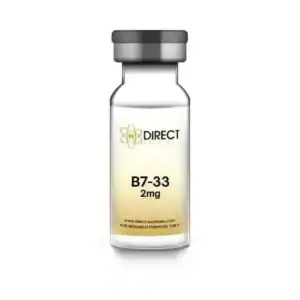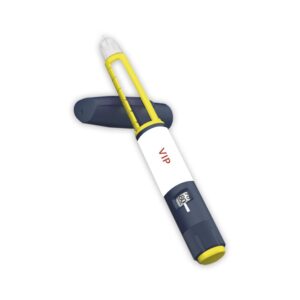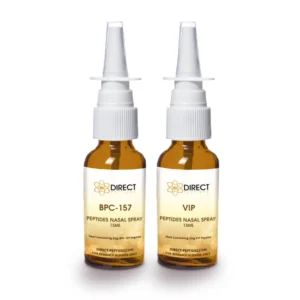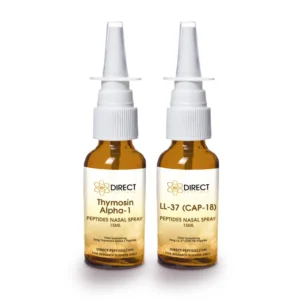The B7-33 peptide benefits for lung health are becoming a focal point in scientific research. New Zealand Studies have highlighted the peptide’s potential in reducing inflammation, improving lung tissue repair, and possibly promoting overall lung health.
B7-33 peptide, still in research stages, offers hope for the treatment of conditions like asthma, chronic obstructive pulmonary disease (COPD), and pulmonary fibrosis. But what are the exact B7-33 peptide benefits for the lungs, and how might it help improve lung function? Let’s delve deeper.
One of the primary B7-33 peptide benefits is its ability to reduce inflammation in the lungs. Chronic inflammation is a key factor in many respiratory diseases such as asthma, COPD, and fibrosis. B7-33 peptide has been shown to regulate the immune response in the lungs by targeting specific immune receptors, thus reducing the inflammatory process.
Lung inflammation causes the airways to narrow, making it difficult to breathe. B7-33 peptide benefits are evident in its ability to reduce the production of inflammatory molecules (cytokines) that trigger this narrowing. In this way, B7-33 peptide may help alleviate the severity of inflammation, providing relief for individuals with chronic respiratory diseases.
Discover B7-33 Peptide from Direct Peptides New Zealand, a powerful peptide that reduces inflammation, supports lung health, and promotes tissue repair.
Chronic inflammation often leads to lung tissue damage and scarring, particularly in conditions like pulmonary fibrosis. This type of scarring impairs the lungs’ ability to expand and contract, reducing overall lung capacity. One of the most exciting B7-33 peptide benefits is its potential role in preventing this kind of tissue damage.
By reducing inflammation and controlling immune cell activity, B7-33 peptide may help protect lung tissues from scarring and preserve lung function over time. For patients suffering from diseases like COPD, where lung tissue is progressively damaged, B7-33 peptide could offer a new form of therapeutic intervention.
In addition to preventing damage, B7-33 peptide may encourage the regeneration of lung tissues. In diseases like pulmonary fibrosis, where lung tissue becomes irreversibly scarred, current treatments are mainly aimed at managing symptoms rather than promoting healing. B7-33 peptide benefits may help change that by promoting the regeneration of healthy lung cells.
Early research suggests that B7-33 peptide may stimulate the production of new lung cells, which could help restore lung function. By aiding in tissue repair, this peptide might be able to slow or reverse the damage caused by chronic inflammation, making it a promising candidate for future treatments.
Explore Peptide Supplies at Direct Peptides New Zealand for all your reconstitution requirements.
 Asthma, a condition marked by chronic inflammation of the airways, is another area where B7-33 peptide benefits are being studied. Asthma is characterized by periodic flare-ups of airway constriction due to inflammation.
Asthma, a condition marked by chronic inflammation of the airways, is another area where B7-33 peptide benefits are being studied. Asthma is characterized by periodic flare-ups of airway constriction due to inflammation.
B7-33 peptide may help in reducing the inflammation that causes these flare-ups, leading to less frequent and less severe asthma attacks.
By targeting the immune response and limiting the overproduction of cytokines, B7-33 peptide could help control asthma symptoms more effectively. This could be especially valuable for patients whose asthma does not respond well to traditional treatments like corticosteroids.
Chronic obstructive pulmonary disease (COPD) is another condition that could benefit from the B7-33 peptide benefits. COPD is often caused by long-term exposure to irritants like cigarette smoke, leading to chronic inflammation and lung tissue damage.
The potential for B7-33 peptide to reduce inflammation and prevent further damage could be crucial in managing COPD.
As B7-33 peptide helps reduce the inflammatory markers that contribute to airway narrowing, it could ease breathing difficulties and improve the quality of life for COPD patients. The regenerative properties of B7-33 peptide also hold promise for preserving lung tissue and preventing the rapid progression of the disease.
 While B7-33 peptide benefits are significant, it’s essential to understand how it compares to other peptides being researched for lung health. For example, VIP peptide (Vasoactive Intestinal Peptide) has shown potential in relaxing airway muscles, reducing inflammation, and improving airflow in conditions like asthma and COPD.
While B7-33 peptide benefits are significant, it’s essential to understand how it compares to other peptides being researched for lung health. For example, VIP peptide (Vasoactive Intestinal Peptide) has shown potential in relaxing airway muscles, reducing inflammation, and improving airflow in conditions like asthma and COPD.
Although B7-33 peptide and VIP peptide work in different ways, both peptides share the ability to address inflammation in the lungs.
VIP peptide primarily acts to relax airway muscles and reduce constriction, which is crucial in asthma and COPD, whereas B7-33 peptide works at a deeper immune level to modulate inflammation.
Both peptides, while distinct in their mechanisms, may play vital roles in advancing respiratory health treatments.
Explore VIP Peptide from Direct Peptides New Zealand, a neuropeptide that helps reduce airway constriction and inflammation for improved lung function and breathing.
In addition to B7-33 peptide, VIP peptide has also attracted attention for its role in lung health. VIP peptide has been studied for its anti-inflammatory effects and its ability to relax smooth muscles in the airways, making it useful in conditions such as asthma and COPD.
By promoting bronchodilation, VIP peptide helps widen the airways, improving airflow and reducing symptoms like wheezing and shortness of breath. While VIP peptide doesn’t specifically target immune regulation in the same way as B7-33 peptide, its ability to reduce inflammation and improve lung function makes it a promising candidate for future treatments.
 The B7-33 peptide benefits for lung health are still under investigation, but the research so far has been promising. As scientists continue to study its effects on inflammation, lung tissue regeneration, and overall lung function, the potential applications for this peptide in treating chronic lung diseases grow clearer.
The B7-33 peptide benefits for lung health are still under investigation, but the research so far has been promising. As scientists continue to study its effects on inflammation, lung tissue regeneration, and overall lung function, the potential applications for this peptide in treating chronic lung diseases grow clearer.
In the future, B7-33 peptide could become a cornerstone in the treatment of diseases like asthma, COPD, and pulmonary fibrosis. However, much more research is needed to confirm its effectiveness and safety.
As we move forward, B7-33 peptide could represent a breakthrough in improving lung health and offering better treatment options for those suffering from chronic respiratory diseases.
The B7-33 peptide benefits for lung health are substantial, offering the potential to reduce inflammation, protect lung tissue, and even promote tissue regeneration. While B7-33 peptide is still in the research phase, its promising effects on chronic lung diseases such as asthma, COPD, and pulmonary fibrosis suggest it could be an essential part of future treatment options.
As New Zealand researchers continue to explore the full range of B7-33 peptide benefits, we may see new therapies that improve the lives of millions of people with lung conditions. The future of peptide-based treatments, including B7-33 peptide, is full of possibilities, and it will be exciting to see where the research leads.
[1] Devarakonda T, Mauro AG, Guzman G, Hovsepian S, Cain C, Das A, Praveen P, Hossain MA, Salloum FN. B7-33, a Functionally Selective Relaxin Receptor 1 Agonist, Attenuates Myocardial Infarction-Related Adverse Cardiac Remodeling in Mice. J Am Heart Assoc. 2020 Apr 21;9(8):e015748.
[2] Praveen P, Wang C, Handley TNG, Wu H, Samuel CS, Bathgate RAD, Hossain MA. A Lipidated Single-B-Chain Derivative of Relaxin Exhibits Improved In Vitro Serum Stability without Altering Activity. Int J Mol Sci. 2023 Apr 1;24(7):6616.
[3] Hossain MA, Kocan M, Yao ST, Royce SG, Nair VB, Siwek C, Patil NA, Harrison IP, Rosengren KJ, Selemidis S, Summers RJ, Wade JD, Bathgate RAD, Samuel CS. A single-chain derivative of the relaxin hormone is a functionally selective agonist of the G protein-coupled receptor, RXFP1. Chem Sci. 2016 Jun 1;7(6):3805-3819.
[4] Zhong HL, Li PZ, Li D, Guan CX, Zhou Y. The role of vasoactive intestinal peptide in pulmonary diseases. Life Sci. 2023 Nov 1;332:122121.
[5] Iwasaki M, Akiba Y, Kaunitz JD. Recent advances in vasoactive intestinal peptide physiology and pathophysiology: focus on the gastrointestinal system. F1000Res. 2019 Sep 12;8:F1000 Faculty Rev-1629.
Shop ALL Peptide Vials from Direct Peptides New Zealand today, your trusted supplier of premium clinical grade peptides online.

B7-33 2mg Pre-Mixed Peptide
£22.55 – £60.88Price range: £22.55 through £60.88 Select options This product has multiple variants. The options may be chosen on the product page
BPC-157 VIP Nasal Stack
£41.13 – £73.26Price range: £41.13 through £73.26 Select options This product has multiple variants. The options may be chosen on the product page
B7-33 Peptide Vial
£16.78 – £57.11Price range: £16.78 through £57.11 Select options This product has multiple variants. The options may be chosen on the product page
Thymosin Alpha-1 LL-37 Nasal Stack
£99.08 – £189.16Price range: £99.08 through £189.16 Select options This product has multiple variants. The options may be chosen on the product pageALL CONTENT AND PRODUCT INFORMATION AVAILABLE ON THIS WEBSITE IS FOR EDUCATIONAL PURPOSES ONLY.
DISCLAIMER: These products are intended solely as a research chemical only. This classification allows for their use only for research development and laboratory studies. The information available on our New Zealand Direct Peptides website: https://direct-peptides.com is provided for educational purposes only. These products are not for human or animal use or consumption in any manner. Handling of these products should be limited to suitably qualified professionals. They are not to be classified as a drug, food, cosmetic, or medicinal product and must not be mislabelled or used as such.